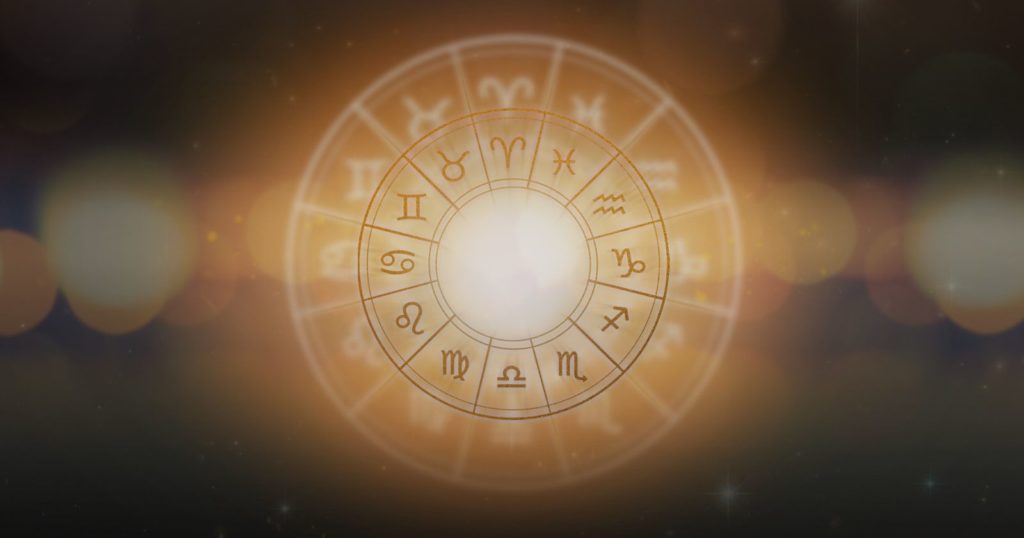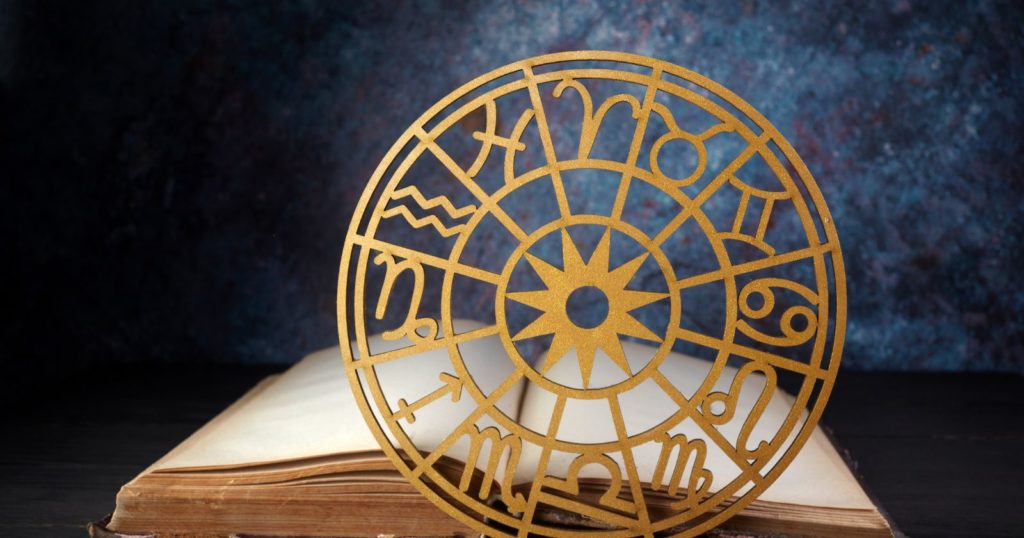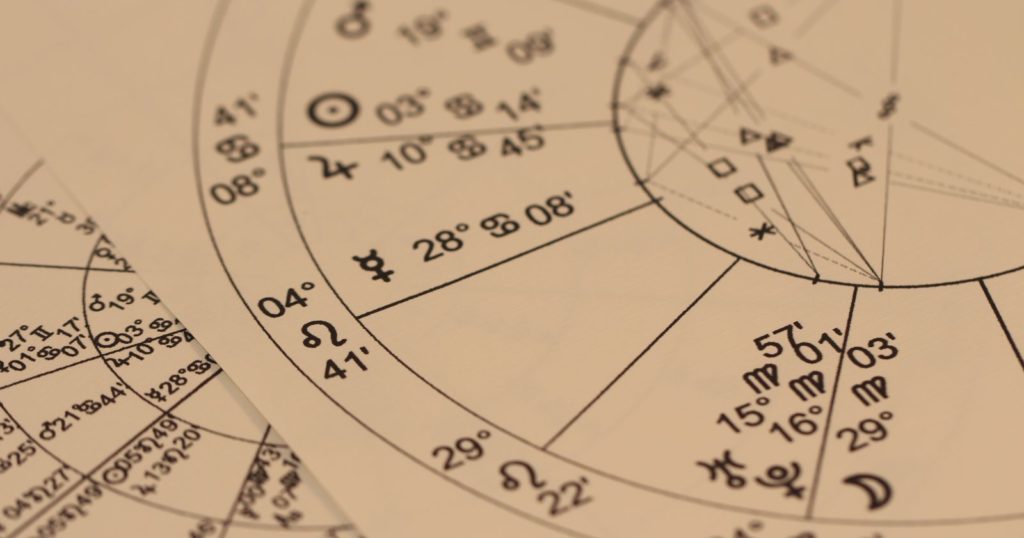Horoscopes and Zodiac signs, their mysterious symbols etched into the sands of time, weave an intricate tapestry across the eons of human history. From our earliest ancestors looking to the heavens for guidance, to modern day readers unwrapping the hidden truths of the cosmos in their morning paper, the Zodiac has had an indelible impact on our lives. Whether it’s the fiery passion of an Aries or the determined fortitude of a Capricorn, the intrigue surrounding these celestial signs is as deep and varied as the cosmos they represent. But the questions beckon – Are Zodiac signs real? What history, cloaked in the shrouds of time, bears testimony to their existence? This article, penned by an expert who has spent a lifetime deciphering the enigmatic language of the stars, takes you on a journey through the constellations, examining the truths and myths that make up our astrological tapestry.
Astrology: The Language of the Stars
Astrology, the study of the movements and relative positions of celestial bodies interpreted as having an influence on human affairs, has been an integral part of human history. Its impact stretches across cultures, permeating the fabrics of ancient civilizations, influencing religion, mythology, and philosophy. This intriguing discipline, governed by complex systems of divination, serves as the cornerstone for understanding the concept of Zodiac signs.
The concept of astrology is believed to have originated in the 3rd millennium BC. Mesopotamians are credited as the first to establish astrology, viewing celestial events as signs and relating them to worldly events and human behavior. The constellations associated with astrology were, however, initially formulated by the ancient Greeks around the 5th century BC. As trade and exploration opened channels of cultural exchange, astrology spread, evolving and adapting to various cultures’ nuances. The art of reading the stars was thus ingrained into the annals of human history, shaping societies and cultures along its path.
The Zodiac: A Celestial Cycle
The Zodiac, derived from the Greek word ‘Zodiakos,’ means ‘circle of animals.’ This celestial circle, divided into twelve 30-degree sections, represents the path along which the sun, moon, and planets journey across the sky. Each of these twelve sections is associated with a constellation, and it’s these constellations that form the basis for Zodiac signs. As the earth orbits around the sun, each month a different constellation appears behind the sun – the sign the sun was ‘in’ at the moment of your birth is considered your sun sign in astrology.
The Zodiac signs as we know them today have their roots deeply embedded in Greek mythology. The Greeks associated each of the twelve constellations with a god or a mythological creature, each with its own unique traits and characteristics. These characteristics were, in turn, attributed to individuals born under each sign. This laid the foundation for the personality profiles that we associate with Zodiac signs today.
Decoding the Zodiac: From Antiquity to Today
The ancient Egyptians and Greeks’ astronomical observations led to the creation of the Zodiac’s basic framework. However, the elaborate character traits associated with each Zodiac sign as we know them today were not fully developed until the Hellenistic period, after Alexander the Great’s conquest of Egypt in 332 BC. This fusion of Greek and Egyptian astrological systems birthed what is now known as Western astrology.
By the 2nd century AD, the elaborate system of horoscopic astrology, which included the ascendant sign, the placement of planets in houses, and aspects between them, had fully evolved. Greek mathematician and astronomer Claudius Ptolemy played a significant role in this. His work, Tetrabiblos, was highly influential and is still considered a crucial text in the study of astrology.
In contrast, Eastern astrology, particularly Chinese and Indian astrology, have different systems. Chinese Zodiac, based on a twelve-year cycle, assigns an animal and its reputed attributes to each year. In contrast, Vedic or Indian astrology relies on a sidereal or visible zodiac, considering the actual positions of constellations in the sky, which differs from Western astrology’s tropical zodiac that is fixed to seasons.
A Peek into the Controversies: Real or Imaginary?
The question, “Are Zodiac signs real?” is as old as astrology itself. Critics argue that astrology is not based on empirical evidence and is hence not a ‘real’ science. They also point to the ‘Barnum Effect,’ a psychological phenomenon where individuals perceive generic descriptions as uniquely applicable to them. Most descriptions associated with Zodiac signs are broad enough that they can apply to various individuals, regardless of their sun sign.
However, defenders of astrology emphasize its symbolic and spiritual significance rather than its scientific validity. They argue that astrology offers a framework to understand human behavior and personality, helping individuals navigate life’s complexities. The debate surrounding astrology’s ‘reality’ thus lies more in the realm of personal belief and experiential validation rather than scientific proof.
Each of these aspects contributes to the rich, complex history behind horoscopes and Zodiac signs. They provide an intriguing lens to view our past, understand our present, and perhaps even divine our future. Whether real or not, their influence on human consciousness is undeniable, making our cosmic journey all the more fascinating.
Astrology Across Cultures
Astrology’s widespread reach has led to a rich cross-pollination of ideas and cultural practices. Different societies have put their own spin on interpreting the stars’ movements, resulting in a myriad of astrological systems, each unique in its philosophy and methodology.
The Mayans, for instance, developed a complex calendar system that incorporated astrological elements. Their “Long Count” calendar, famous for the 2012 doomsday prediction, is based on a 5,125-year cycle, aligning with significant astronomical events.
In the Far East, the Chinese Zodiac has etched itself into the cultural psyche over millennia. Instead of a monthly cycle, the Chinese Zodiac comprises a twelve-year cycle, each year symbolized by a different animal sign, representing specific traits and characteristics.
Similarly, Vedic astrology, practiced primarily in India, offers a distinctive perspective. It relies on a sidereal or visible zodiac, incorporating the actual positions of constellations, as opposed to the tropical zodiac of Western astrology that is fixed to seasons. Vedic astrology places significant emphasis on the ‘navagrahas’ or nine celestial entities, integrating them into various aspects of Indian culture, from temple architecture to daily rituals.
Horoscopes: Personalized Star Messages
The daily, weekly, or monthly horoscopes we come across in newspapers, magazines, or online platforms are based on sun sign astrology, the simplest form of astrology. Sun sign astrology assumes that every person under the same Zodiac sign will experience similar influences based on the position of the sun at the time of their birth.
This form of astrology became popular in the 20th century, with astrologer R.H. Naylor credited for its rise. When Princess Margaret was born in 1930, Naylor, writing for the Sunday Express, predicted events in her life based on her birth time. The predictions resonated with the readers, leading to Naylor’s regular astrological column, which eventually popularized horoscopes in the western world.
However, sun sign astrology is a greatly simplified version of the art, disregarding other astrological aspects such as moon sign, ascendant sign, and planetary positions, which many astrologers argue are crucial for accurate predictions.
The Age of Aquarius: Astrology in the Modern World
In today’s modern world, astrology has taken a front-row seat in pop culture. From astrology memes going viral on social media to Zodiac-themed merchandise, the popularity of astrology is soaring high. It’s become a form of self-expression and identity, as people connect and relate based on their Zodiac signs.
However, modern astrology has also faced its share of criticism. Astrology apps and online horoscope sites have been criticized for commercializing and trivializing this ancient practice. While these platforms have made astrology more accessible, skeptics argue that they’ve diluted the discipline’s depth and complexity.
Despite the controversies, astrology continues to hold sway in the modern psyche, offering comfort, guidance, and a sense of belonging to many. It serves as a tool for introspection, allowing us to explore our strengths, confront our weaknesses, and better understand our relationships and experiences.
The Science vs. Spirit Debate
Astrology’s status as a science or a spiritual practice is a hotly debated topic. Critics, including many in the scientific community, dismiss astrology as a pseudoscience, citing the lack of empirical evidence and the non-reproducibility of astrological predictions.
Moreover, the ‘Forer Effect’ or the ‘Barnum Effect’ often comes into play in astrology’s criticism. Named after psychologist Bertram Forer, this effect explains why people relate to vague and general personality descriptions, thinking they are tailored for them.
Astrology enthusiasts, on the other hand, defend its spiritual and symbolic significance. They argue that astrology isn’t meant to predict concrete events but to provide a lens to understand oneself and the world better. For them, the ‘reality’ of Zodiac signs lies not in their scientific verifiability but their ability to provide insights and narratives that resonate on a personal level.
Regardless of the ongoing debate, astrology and Zodiac signs remain captivating concepts, influencing human life and thought in myriad ways. Whether they are ‘real’ or not is subjective, largely dependent on individual experiences and beliefs.
A Glimpse Into The Future of Astrology
Despite its ancient roots, astrology continues to evolve, adapting to the zeitgeist of each era. With advancements in technology, the future of astrology looks to be just as vibrant as its past. The rise of astrology apps and AI-based horoscope predictions indicate an increasing demand for personalized and real-time astrological insights.
Moreover, contemporary astrologers are redefining astrological practices to resonate with modern values and sensibilities. The growing recognition of non-binary gender identities, for example, is leading to conversations about moving beyond gender-based interpretations of astrological symbols.
But as astrology evolves, it also faces challenges. With the spread of misinformation on the internet, distinguishing between authentic astrological practices and unverified claims is becoming increasingly difficult. The commercialization of astrology has also raised concerns about the dilution of its philosophical depth.
Drawing The Astrological Map
Astrology is an intricate web of symbols, planets, houses, and aspects. Each component tells a unique story about the individual. The sun sign, the most popular element of astrology, represents our core personality, the essence of who we are. The moon sign, on the other hand, symbolizes our emotional response, our fears, and desires. Similarly, the ascendant or rising sign represents the face we show to the world, our social personality.
Apart from these, the position of other planets in various Zodiac signs and houses influences different aspects of our life. For example, Venus governs love and beauty, Mars rules our action and energy, while Jupiter signifies growth and expansion. Each planet’s position, the aspects or angles they form with each other, and their placement in different houses collectively create the individual’s astrological chart, providing a comprehensive personality profile and life outlook.
The Power of Belief
Whether Zodiac signs are real or not is a complex question. From a strictly scientific perspective, there’s no empirical evidence to support the claim that celestial bodies influence our personalities or destinies. However, astrology’s value for many doesn’t lie in its scientific validity but in its capacity to provide meaningful narratives, allowing us to navigate the complexities of human existence.
For believers, astrology offers a sense of comfort and control. It provides a cosmic roadmap, allowing them to make sense of their experiences and emotions. The Zodiac signs serve as archetypes that help us understand different personality types, bringing clarity to our relationships and life patterns. This interpretative power of astrology makes it a valuable tool for introspection and personal growth.
Astrology’s Influence on Society and Popular Culture
Astrology’s influence has permeated every layer of society and culture. From Shakespeare’s plays laden with astrological references to the Zodiac-inspired compositions of Gustav Holst, astrology has found its place in the arts. Today, it’s hard to miss the Zodiac-themed products, from clothing to home decor, astrology-based dating apps, and the omnipresent social media astrology memes.
Moreover, many famous figures, including politicians and celebrities, have been known to consult astrologers. Former US President Ronald Reagan’s wife, Nancy Reagan, famously consulted an astrologer after an assassination attempt on her husband. Carl Jung, a pioneering psychologist, used astrology to understand his patients’ unconscious dynamics. However, it’s crucial to approach astrology with discernment. While it can offer insights and perspectives, treating it as an absolute authority can lead to a deterministic mindset, limiting our personal growth and freedom of choice.
Astrology as a Spiritual Practice
Many people turn to astrology as a spiritual practice. In the face of an increasingly mechanized and impersonal world, astrology provides a sense of connection and purpose. The cosmic narrative, where our lives are part of a grand celestial dance, brings a sense of awe, mystery, and significance.
Astrology encourages introspection and self-understanding. It prompts us to confront our shadows and acknowledge our strengths. It gives us a language to articulate our inner world, enhancing our emotional intelligence. It also fosters a sense of unity, a cosmic kinship, that transcends geographical, cultural, and temporal boundaries.
A Cosmic Conclusion
The world of astrology is a universe unto itself, filled with fascinating histories, mystical interpretations, and complex debates. Whether or not Zodiac signs are real, they have an undeniable impact on our cultural and personal landscapes. They connect us with the cosmos, make sense of the human psyche, and add a dash of magic and mystery to our mundane lives.
To answer the question “Are Zodiac signs real?” we perhaps need to reconsider what ‘real’ means. If reality is defined by what impacts our lives, shapes our beliefs, and offers a sense of meaning and purpose, then perhaps, Zodiac signs, in their own unique way, are as real as the stars that light up the night sky.
To conclude, the realm of Zodiac signs and horoscopes is not just about predicting the future or categorizing personalities. It is a symbolic language, a conceptual framework that allows us to contemplate the interplay of universal and personal, the cosmic and the individual. It is a reflection of our perennial quest to understand ourselves and the world around us.
Whether Zodiac signs are real or not may not be the most critical question. The question is whether they provide value, insight, and a meaningful perspective to our lives. If the answer is yes, then in the realm of personal experience and subjective reality, Zodiac signs hold a truth of their own.
Resources for Further Reading:
- “The Only Astrology Book You’ll Ever Need” by Joanna Martine Woolfolk: An excellent resource for anyone interested in astrology, providing comprehensive information about Zodiac signs, houses, planets, and aspects.
- “Astrology: A Cosmic Science” by Isabel M. Hickey: This book provides a spiritual perspective on astrology, delving into the deeper aspects of the Zodiac signs and their spiritual implications.
- “Cosmos and Psyche: Intimations of a New World View” by Richard Tarnas: A thought-provoking book that explores the correlations between planetary alignments and historical patterns, offering a fresh perspective on astrology’s relevance in understanding our world.




